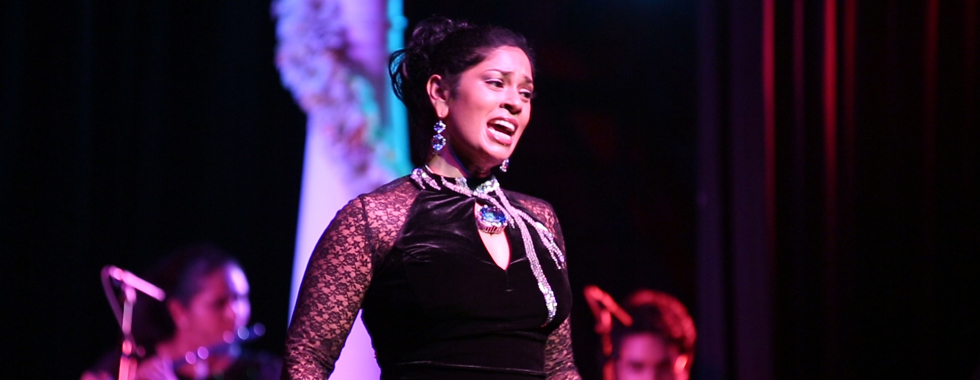A star, a star….singing in the night
Familarity breeds contempt, they say. It shouldn’t, but perhaps in some situations – like marriage – it does. What familiarity does breed on a less objectionable scale though, is a lack of perspective. For instance, when I meet Mahela Jayawardena, I tend to forget that I am in the presence of one of the Greatest Batsmen in The World, and treat him instead as a mate, who sadly supports Manchester United. Similarly, running into Kishani Jayasinghe-Wijesekera, on the street in Colombo, or on a busy Baker Street tube platform, it’s easy to see her only as an old friend, the Visakhian Head Prefect, who, atypically, was never short of a retort for a rude joke. It’s easy to forget, that she is a supremely talented soprano who has had audiences with the Queen, and rubbed noses with the likes of Placido Domingo.
Having heard of the depth of her talent from innumerable sources, it was a surprise that it took so many years to actually hear Kishani sing. Not being privileged enough to attend her numerous operatic and theatrical performances, it was indeed a pleasure to see her within the walls of the familiar Lionel Wendt, when she sang for displaced children in the new year.
The uncharacteristic early buying of tickets, the packed house, and the air of expectancy, cleverly harnessed by Mohamed Adamaly, the host for the evening, showed that I was not alone in my eagerness to hear for myself, what had only been spoken of previously. That Kishani had a stunning, powerful voice was not a surprise. That she would dwarf most talent was also a given for anyone who had a glimpse of her drive and ability, at any time of her life. But to be compared favourably to Kiri Te Kanawa – now that’s a biggie.
And throughout the evening she showed us why. Her performance was powerful, but restrained. Emotional but controlled. Awesome, but ever so effortless. As she said after her finale, she didn’t want to disappoint her home crowd, and she didn’t even come close to doing that.
Kishani was always a larger than life character. And she has grown into the high heels of a celebrated performer with congenital ease. The smile which reels the audience into the palm of her hand, the impromptu engagements she had with us, were signs of supreme confidence, borne of years of hard work and training. Talent is one thing. There are hundreds of thousands of talented singers, actors, dancers who gravitate to London and New York in the hope of becoming a star. Few realise their dreams, and for those who do, it is a sign not only of their talent, but of their perseverance as well.
Having had her daughter only ten months ago, it was obvious how much dedication had gone into getting performance ready for her beloved Colombo. Looking as good as she sounded, it was nice to see a performer enjoying her performance as much as the audience were. Everything about the evening was elegant. The audience, which gathered in Colombo’s music and theatre A list. The ushers, who were competent, polite and informed. The free, and informative programme. It was all impeccably thought out, as so seldom happens here in Sri Lanka. Kishani’s wardrobe was whimsical and eclectic within the bounds of the operatic genre of wardrobe, and provided the visual appetiser to the auditory entree. Perhaps she could have been attired a little less formally in the first part of the show which comprised seven folk songs from around the world, as the five arias provided ample gravitas to the evening’s selection.
The arrangement of the Sinhala folk song, together with the adapted rendition of some popular classics in the second half of the show showed innovation and sensitivity to her audience. Colombo is usually starved of quality entertainment, and exposing the audience to the full rigours of European opera may have been a little overwhelming. Her apology for keeping the audience waiting for a barely noticed minute, also showed the professionalism of her craft, along with the nonchalance of home. It was a comfortable blend. Like a Jayawardena innings. Understated, easy brilliance, with a smile and the humility that springs from the knowledge that no player is greater than the game.
Perhaps the white pillars in the background were unnecessary, and the lighting could have been more stark. The many shades of the cyclorama didn’t quite provide the necessary atmosphere, and a single spot on a darkened stage may have provided more ambience to some of the pieces. Kudos also to the accompanists, Soundarie David, Sureka Amerasinghe, Satish Casie Chetty and Shamistha de Silva. They didn’t miss a beat.
From the miniscule talent pool available, Sri Lanka has not done too badly. Thusitha Jayawardena made it to the Royal Shakespeare Company, Hiran Abeysekera has played leads on the West End and cast at the National Theatre. Tanya Ekanayaka has played solo concerts at St. Martin in the Field and many other venues. But as the last aria stated, in her genre, Kishani is the jewel in the Sri Lankan crown. It is unfortunate we – her compatriots – do not see more of her, this ‘handmaiden of the arts’ through whom the muses work so charmingly.


